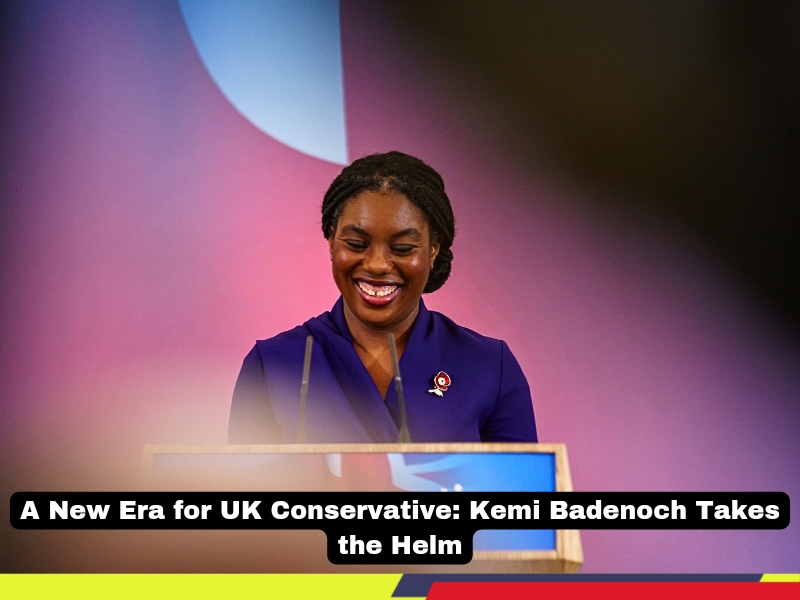The Conservative Party has chosen Kemi Badenoch as its new leader, a historic win that brings significant ideological shifts. Badenoch, a compelling figure known for her unapologetic stance on issues like identity politics and immigration, promises a renewed direction for a party reeling from a historic election loss. Her victory over fellow contender Robert Jenrick marks her as the first Black woman to lead a major British political party, setting a bold tone for UK politics.
A Rightward Shift for the Tories
Badenoch’s win is a clear signal of the Conservative Party’s rightward pivot, as she becomes a figurehead for members who favor strong stances on cultural issues. She has been vocal on polarizing topics like transgender rights, public spending, and the role of identity politics in society. Her approach promises to reshape the UK’s political conversation, pitching the Tories as a party ready to return to its conservative roots and reclaim its base.
In her acceptance speech, Badenoch acknowledged the mistakes of past leadership and pledged to be transparent and bold in reforming the party’s direction. Her message was clear: “The time has come to tell the truth, to stand up for our principles, to plan for our future, to reset our politics and our thinking.” She highlighted the importance of building a clear strategy to hold the current Labour government accountable and prepare the Tories to return to power.
The Challenges Ahead
The task ahead for Badenoch is daunting. The Conservative Party was handed a devastating defeat in the last election, reducing its seats from 372 to 121—its lowest in recent memory. Labour’s Keir Starmer now stands as the Prime Minister, with the support of a frustrated public tired of the Conservatives’ internal conflicts and missteps on issues like the economy, immigration, and crime. Badenoch’s challenge is to rebuild trust and rally voters to her vision of conservatism while addressing the fissures within her own party.
Badenoch’s task will also be to retain her party’s traditional base, which has become divided between those who prefer a pro-European stance and those drawn to a stricter, more nationalist approach. Her history as a Brexit supporter provides her with credibility among the more conservative base, but her softened stance toward the European Union and openness to collaborative diplomacy show a pragmatism that could appeal to more moderate conservatives.
An Uncompromising Voice
Badenoch’s views have sparked both praise and controversy. She has opposed critical race theory, defended British imperial history, and proposed a biological definition of sex, which has received criticism from trans rights advocates. Her recent campaign remarks on reducing statutory maternity pay and jailing civil servants garnered mixed reactions, reinforcing her image as a no-nonsense, outspoken conservative who resonates with right-wing grassroots members.
With a background that includes stints in Nigeria and the U.S., a university education in computer engineering, and a career in banking, Badenoch’s unique perspective is well-suited to appealing to the Conservatives’ diverse right-leaning base. Her past roles in equalities, business, housing, and trade departments during the Conservative administration lend her policy expertise and bolster her credibility as she takes on Labour in the years to come.
Preparing for 2029: Can Badenoch Win Back Voters?
Badenoch’s goal is to present a unified Conservative vision by the next general election in 2029. Despite Labour’s recent win, Starmer’s popularity is already experiencing a dip, giving Badenoch a window to appeal to voters disillusioned with Labour’s approach. Starmer’s approval ratings have slipped, and Labour’s modest electoral gains, supported by only a third of the popular vote, suggest potential vulnerabilities.
With the US presidential election in the background, Badenoch’s first real test will come in her debut at Prime Minister’s Questions (PMQs) on Wednesday, where she’ll spar with Starmer on policies and priorities. This moment offers her a valuable opportunity to define herself publicly and capture the spotlight.
Final Thoughts: A Defining Era for the Conservative Party
Kemi Badenoch’s rise to Conservative leadership signals a defining moment, with the party committing to a more defined conservative vision. As she sets out to repair the party’s reputation and restore its electoral fortunes, her direct approach, unique background, and sharp rhetoric could re-energize a fractured Conservative base and pose a real challenge to Starmer’s Labour government. Only time will tell if Badenoch’s bold leadership can bring her party back from the brink.




